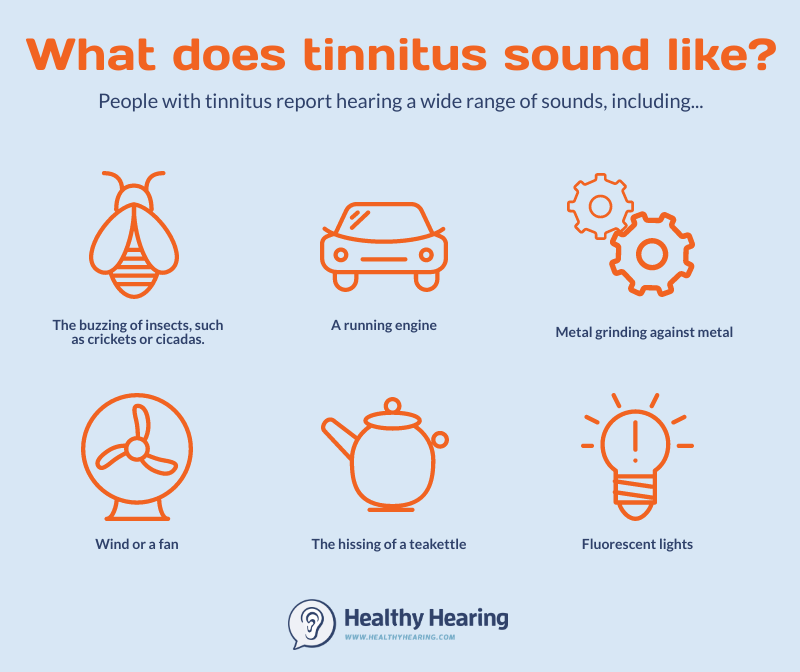Tinnitus can sound like any number of annoying tones, including ringing, buzzing, hissing or whizzing. It can be loud, soft, or any volume in between, and the sound can range from a low-pitched roar to a high-pitched squeal. It may occur nearly constantly or come and go.

to ignore.
Table of Contents
Symptoms of tinnitus
What does tinnitus sound like?
Common descriptions of tinnitus symptoms include hearing cicadas, wind, crickets, fluorescent lights, squeals, running engines, grinding steel or dripping tap water. Some people even say it sounds like a motorboat or car engine in their ears.
It’s important to know that tinnitus can be a symptom itself—it’s linked to many different medical conditions, and even some medications can trigger it. It’s also strongly linked to hearing loss and loud noise exposure.
However, whenever a medical cause can’t be uncovered, tinnitus can be considered a disease in and of itself. In most cases, there is no known cure, though treatments and related alternative relief strategies can help.

Chronic tinnitus: When it won’t go away
Occasional bouts of brief noise that lasts a few seconds is considered “transient” and something most people experience from time to time. A diagnosis of chronic tinnitus usually means a person reports episodes of tinnitus that last for at least five minutes and occur at least twice a week. You may also experience tinnitus spikes.
It’s possible to have tinnitus in just one or both ears, and it can come and go. Tinnitus can get loud enough to interfere with concentration, and sometimes, it can mask natural sounds. Tinnitus is most commonly experienced by adults, especially those who have hearing loss.
Tinnitus is most commonly experienced by adults who have hearing loss.
In a very large survey of American adults with tinnitus, nearly a third reported having symptoms nearly constantly. About the same number of people noticed tinnitus at bedtime.
Note: If you experience tinnitus and sudden hearing loss, seek prompt treatment.
The emotional symptoms of tinnitus
Having a constant ringing in your ears is not pleasant, and you may have trouble falling asleep or concentrating at work. The constant annoyance, lack of sleep and inability to live your life as you used to may even cause increased anxiety. Anxiety is especially common if tinnitus is getting in the way of work or causing other stressful situations. Many people who have tinnitus often describe a connection between tinnitus perception and stress. You may even suffer from depression or thoughts of suicide in response to the persistent buzzing or ringing that feels inescapable. Along with treatments, behavioral strategies can make tinnitus more manageable.
Track your tinnitus symptoms
Having a good grasp of the tinnitus sounds you hear, when you hear them and how often you hear them may be able to help your hearing care professional or physician determine the best way to treat your tinnitus. Keeping a symptom diary for a few weeks is a good idea.
A tinnitus evaluation from a hearing healthcare practitioner will begin with a series of questions designed to get a clear description of your symptoms such as:
- How long has this been going on?
- Is it regular or constant?
- Are the symptoms worse at certain points of the day?
- Which ear is causing the issue? Both?
- How loud is the noise?
- Is the pitch high or low?
- Is the issue extremely bothersome or just a little irritating?
- Are there certain conditions that make the symptoms worse, such as exposure to noise or caffeine intake?
- Does the sound ever change?
- Do you also suspect you might have hearing loss? Tinnitus can be a symptom of hearing loss.
Can tinnitus sound like clicking?
In most cases, no. Most tinnitus sounds like a ringing, hissing or buzzing sound. If you do hear a persistent clicking sound, it’s worth investigating, though.
For some people, the jarring motion of brisk walking can produce what is called a seismic effect, which causes movement in the small bones and/or contractions in the muscles of the middle ear space. You can experiment to find out if this is the cause by walking slowly and smoothly to see if the clicking is present. Then, try walking quickly and with a lot of motion to see if you hear the clicking. You can also test for the seismic effect by moving your head up and down quickly.
If you do detect the seismic effect, it is likely nothing that indicates a serious medical condition. However, if it is a constant annoyance, by all means discuss it with your hearing care professional.
Get help from an expert
Find a tinnitus doctor near you by going to our directory of hearing care providers. Please note that not all hearing clinics treat tinnitus, so you may need to browse several clinic pages to find the right provider.
Before your first appointment, take note of your specific symptoms, when they occur and what environments make them better or worse. This work ahead of time will prepare you for the first questions asked by the practitioner and ensure you get the most out of your evaluation.

